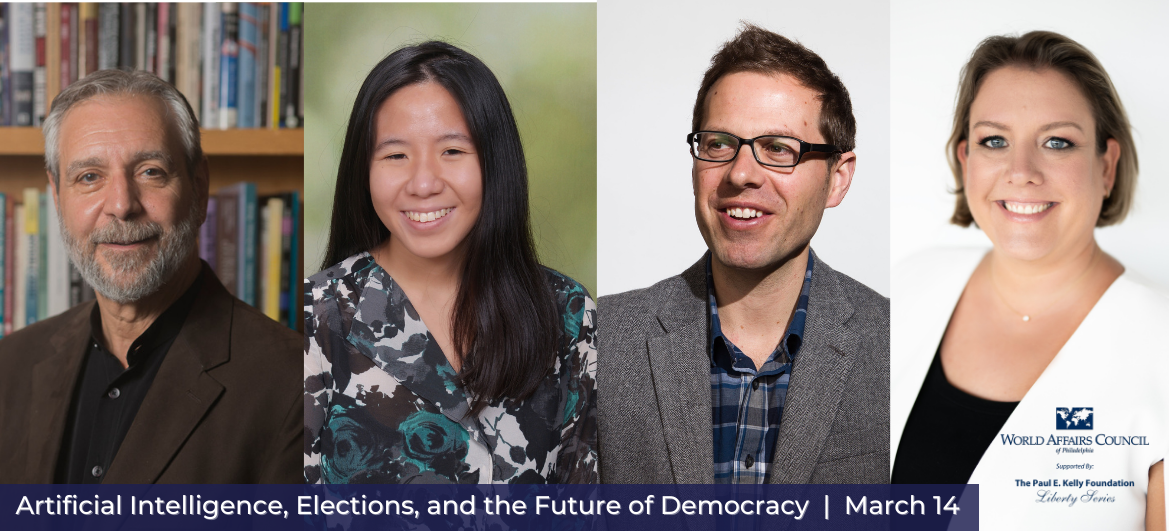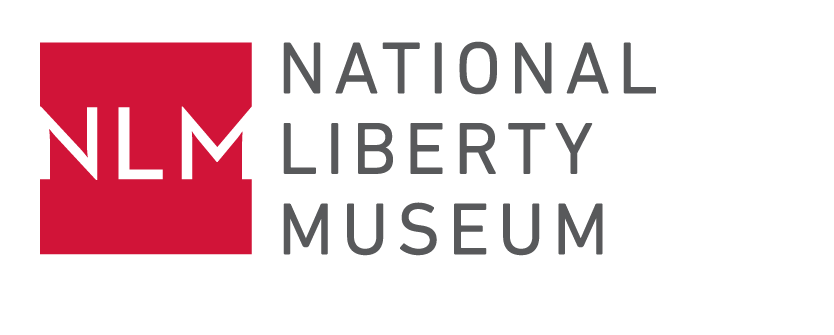

- This event has passed.
Artificial Intelligence, Elections, and the Future of Democracy
March 14, 2024 5:30 pm - 8:00 pm

This event is currently sold out.
From algorithmic news feeds to deep fakes, AI is poised to transform people’s day to day engagement with politics. On a broader scale, the role of AI in transnational election interference and surveillance has led to international controversy as nations around the world struggle to respond. Bridging the everyday and the international, the National Liberty Museum and the World Affairs Council of Philadelphia present a panel exploring how AI might shift democratic norms and influence democratic procedures in our election year and in the realm of global politics. Convening a panel of industry, academic, and government professionals in AI and democratic monitoring, we ask not just what is happening, but what to do.
5:30 pm
Doors open
6 pm
Panel begins in Liberty Hall, followed by Q&A with the panelists and moderator
7:15 pm
Panel and Q&A concludes, networking reception with panelists and moderator begins
8 pm
Doors close
Before the panel discussion, teachers, educators, and school faculty are invited to a free professional development session focused on Teaching in the Age of A.I.. For more information and to register to attend, visit the event page on our website. Separate pre-registration is required.
$25 General Admission / $10 Members of the National Liberty Museum or World Affairs Council / $5 Students, Teachers, or School Faculty (w. valid ID)
Purchase TicketsAmplified: Art, Music, Power
array(3) { ["title"]=> string(16) "Purchase Tickets" ["url"]=> string(101) "http://16291.blackbaudhosting.com/16291/Artificial-Intelligence-Elections-and-the-Future-of-Democracy" ["target"]=> string(6) "_blank" } Purchase Tickets Become a MemberMeet the Panelists




Michael Delli Carpini (moderator)
Michael Delli Carpini (moderator) is the Oscar H. Gandy Emeritus Professor of Communication and Democracy at the University of Pennsylvania’s Annenberg School for Communication, serving as Dean from 2003 to 2018. Prior to joining Penn in 2003, he served as Director of the Public Policy Program of the Pew Charitable Trusts (2000-2003), and as a professor of Political Science at Barnard College and Columbia University (1987-2002) and Rutgers University (1980-1987). He received his PhD in Political Science from the University of Minnesota in 1980. Dell Carpini’s research explores the role of the citizen in democratic politics, with particular emphasis on the impact of mass media and information and communications technologies on public opinion, public deliberation, political knowledge, and political participation. He was awarded the 2008 Murray Edelman Distinguished Career Award from the Political Communication Division of the American Political Science Association, and elected as a Fellow of the International Communication Association in 2018.






















Caitlin Chin-Rothmann
Caitlin Chin-Rothmann is a fellow at the Center for Strategic and International Studies (CSIS) in Washington, D.C., where she researches the impact of technology on geopolitics and society. Her current research interests include the relationships between data brokers and government agencies, the evolution of news in a digital era, and the role of technology platforms in countering online harmful content. Prior to joining CSIS, she worked as a research analyst at the Brookings Institution, where she primarily analyzed developments in U.S. privacy and antitrust legislation. Her work has been published with CSIS, the Brookings Institution, Slate, Barron’s, the Georgetown Journal of International Affairs, the Georgetown Public Policy Review, and the University of Pennsylvania’s Regulatory Review. In addition, she has provided commentary for U.S. and international television, radio, and digital news outlets including the New York Times, CNN, CBS News, and BBC News. She has a BA in government and Spanish from the University of Maryland and an MPP from Georgetown University’s McCourt School of Public Policy.






















Katie Harbath
Katie Harbath is a global leader at the intersection of elections, democracy, and technology. As the chief executive of Anchor Change, she helps clients think through tech policy issues. She is a senior advisor for technology and democracy at the International Republican Institute and is also a fellow at the Bipartisan Policy Center, the Integrity Institute and a nonresident fellow at the Atlantic Council. Previously, Katie spent 10 years at Facebook. As a director of public policy, she built and led global teams that managed elections and helped government and political figures use the social network to connect with their constituents. Before Facebook, Katie held senior digital roles at the Republican National Committee, the National Republican Senatorial Committee, and the DCI Group, as well as multiple campaigns for office. She is a board member at the National Conference on Citizenship, Democracy Works, R Street and the Center for Journalism Ethics at the University of Madison-Wisconsin. Katie writes a weekly newsletter on Substack called Anchor Change and hosts the podcast Impossible Tradeoffs.






















David Ryan Polgar
David Ryan Polgar is a pioneering tech ethicist, Responsible Tech advocate, and expert on ways to improve social media and our information ecosystem, along with increasing the ethical considerations regarding emerging technologies. He specializes in uniting a diverse range of stakeholders to tackle complex tech and society issues, cultivating conducive environments for forward progress. David is the founder of All Tech Is Human, a non-profit organization synonymous with the Responsible Tech movement that is building a global, multistakeholder, multidisciplinary network that improves our ability to understand and grapple with difficult issues related to social media, AI, and emerging technology. As the leader of All Tech Is Human, he has created a unique grassroots-power model that is uniting thousands of individuals across the globe to understand values, best practices, and best pathways forward.






















Michael Delli Carpini (moderator)
Michael Delli Carpini (moderator) is the Oscar H. Gandy Emeritus Professor of Communication and Democracy at the University of Pennsylvania’s Annenberg School for Communication, serving as Dean from 2003 to 2018. Prior to joining Penn in 2003, he served as Director of the Public Policy Program of the Pew Charitable Trusts (2000-2003), and as a professor of Political Science at Barnard College and Columbia University (1987-2002) and Rutgers University (1980-1987). He received his PhD in Political Science from the University of Minnesota in 1980. Dell Carpini’s research explores the role of the citizen in democratic politics, with particular emphasis on the impact of mass media and information and communications technologies on public opinion, public deliberation, political knowledge, and political participation. He was awarded the 2008 Murray Edelman Distinguished Career Award from the Political Communication Division of the American Political Science Association, and elected as a Fellow of the International Communication Association in 2018.






















Caitlin Chin-Rothmann
Caitlin Chin-Rothmann is a fellow at the Center for Strategic and International Studies (CSIS) in Washington, D.C., where she researches the impact of technology on geopolitics and society. Her current research interests include the relationships between data brokers and government agencies, the evolution of news in a digital era, and the role of technology platforms in countering online harmful content. Prior to joining CSIS, she worked as a research analyst at the Brookings Institution, where she primarily analyzed developments in U.S. privacy and antitrust legislation. Her work has been published with CSIS, the Brookings Institution, Slate, Barron’s, the Georgetown Journal of International Affairs, the Georgetown Public Policy Review, and the University of Pennsylvania’s Regulatory Review. In addition, she has provided commentary for U.S. and international television, radio, and digital news outlets including the New York Times, CNN, CBS News, and BBC News. She has a BA in government and Spanish from the University of Maryland and an MPP from Georgetown University’s McCourt School of Public Policy.






















Katie Harbath
Katie Harbath is a global leader at the intersection of elections, democracy, and technology. As the chief executive of Anchor Change, she helps clients think through tech policy issues. She is a senior advisor for technology and democracy at the International Republican Institute and is also a fellow at the Bipartisan Policy Center, the Integrity Institute and a nonresident fellow at the Atlantic Council. Previously, Katie spent 10 years at Facebook. As a director of public policy, she built and led global teams that managed elections and helped government and political figures use the social network to connect with their constituents. Before Facebook, Katie held senior digital roles at the Republican National Committee, the National Republican Senatorial Committee, and the DCI Group, as well as multiple campaigns for office. She is a board member at the National Conference on Citizenship, Democracy Works, R Street and the Center for Journalism Ethics at the University of Madison-Wisconsin. Katie writes a weekly newsletter on Substack called Anchor Change and hosts the podcast Impossible Tradeoffs.






















David Ryan Polgar
David Ryan Polgar is a pioneering tech ethicist, Responsible Tech advocate, and expert on ways to improve social media and our information ecosystem, along with increasing the ethical considerations regarding emerging technologies. He specializes in uniting a diverse range of stakeholders to tackle complex tech and society issues, cultivating conducive environments for forward progress. David is the founder of All Tech Is Human, a non-profit organization synonymous with the Responsible Tech movement that is building a global, multistakeholder, multidisciplinary network that improves our ability to understand and grapple with difficult issues related to social media, AI, and emerging technology. As the leader of All Tech Is Human, he has created a unique grassroots-power model that is uniting thousands of individuals across the globe to understand values, best practices, and best pathways forward.




















